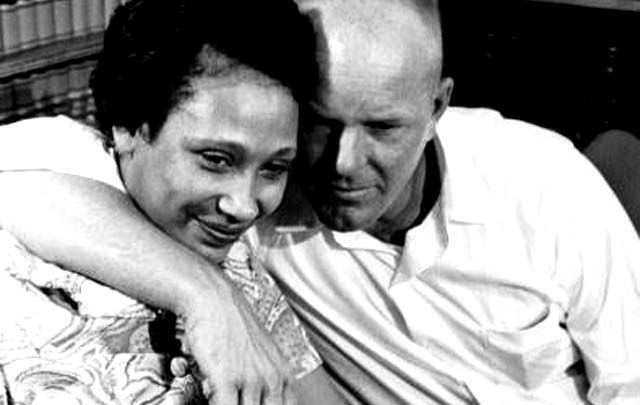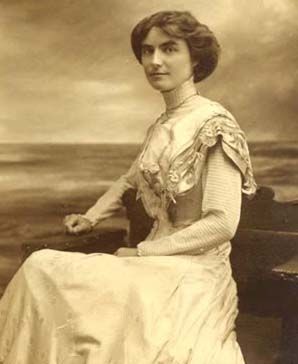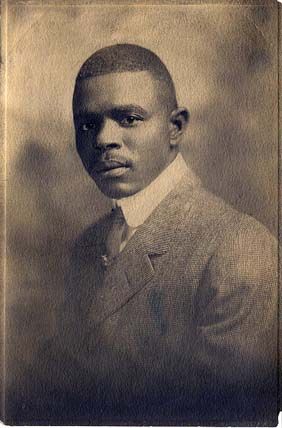
Mildred Jeter Loving and Richard Loving
Today is Loving Day.
NPR had this story:
‘They Just Were in Love’
Richard Loving was white; his wife, Mildred, was black. In 1958, they went to Washington, D.C. – where interracial marriage was legal – to get married. But when they returned home, they were arrested, jailed and banished from the state for 25 years for violating the state’s Racial Integrity Act.
To avoid jail, the Lovings agreed to leave Virginia and relocate to Washington.
For five years, the Lovings lived in Washington, where Richard worked as a bricklayer. The couple had three children. Yet they longed to return home to their family and friends in Caroline County.
That’s when the couple contacted Bernard Cohen, a young attorney who was volunteering at the ACLU. They requested that Cohen ask the Caroline County judge to reconsider his decision.
“They were very simple people, who were not interested in winning any civil rights principle,” Cohen, now retired, tells Michele Norris.
“They just were in love with one another and wanted the right to live together as husband and wife in Virginia, without any interference from officialdom. When I told Richard that this case was, in all likelihood, going to go to the Supreme Court of the United States, he became wide-eyed and his jaw dropped,” Cohen recalls.
The Loving Day website has the complete history:
Their case went through many levels of the justice system and their appeal was denied every time. Eventually their case appeared before the United States Supreme Court. The Court decided unanimously in their favor. Finally, after nine years of struggle, the Loving won the right to live together as husband and wife in their home state. In the words of Chief Justice Earl Warren, “Under our Constitution, the freedom to marry, or not marry, a person of another race resides within the individual and cannot be infringed on by the State.”The Victory
The Loving’s case not only won them their freedom to love, but it also granted the same freedom to every interracial couple in every state in America. At the time of the Loving decision, sixteen states from Delaware to Texas had laws banning interracial couples. Loving v. Virginia (1967) made it illegal for these states to enforce those laws. This ended a long era of laws that were enforced in forty-two states over the course of American history. These laws did not only apply to black people and white people; many states also restricted relationships with Asians, Native Americans, Indians, Hispanics, and other ethnic groups.The freedom to love is something most of us take for granted. Like many other freedoms, the right for interracial couples to be together was fought for and won as a part of our civil rights. Many people see this as the longest-lasting part of the legal segregation that used to rule our nation. The Lovings, like Rosa Parks, played an important role in freeing us from laws that punished people for no other reason than the color of their skin.
Their Mission Statement:
Loving Day’s mission is to fight racial prejudice through education and to build multicultural community.
The year before she died Mildred Loving issued this statement:
Loving for All
By Mildred Loving*
Prepared for Delivery on June 12, 2007,
The 40th Anniversary of the Loving vs. Virginia AnnouncementSurrounded as I am now by wonderful children and grandchildren, not a day goes by that I don’t think of Richard and our love, our right to marry, and how much it meant to me to have that freedom to marry the person precious to me, even if others thought he was the “wrong kind of person” for me to marry. I believe all Americans, no matter their race, no matter their sex, no matter their sexual orientation, should have that same freedom to marry. Government has no business imposing some people’s religious beliefs over others. Especially if it denies people’s civil rights.
I am still not a political person, but I am proud that Richard’s and my name is on a court case that can help reinforce the love, the commitment, the fairness, and the family that so many people, black or white, young or old, gay or straight seek in life. I support the freedom to marry for all. That’s what Loving, and loving, are all about.
I’m celebrating today in honor of my grandparents – George and Mabel Oliver, who had to leave Kansas to marry in Milwaukee, in 1915 – because their love would have been illegal.
My grandmother Mabel Bodine Oliver
My grandfather George Shelvy Oliver
We’ve come a long way since my grandparents had to leave home to marry but we still have a long way to go.
See this result from a recent poll of Republicans in Mississippi:
We asked voters on this poll whether they think interracial marriage should be legal or illegal- 46% of Mississippi Republicans said it should be illegal to just 40% who think it should be legal. For the most part there aren’t any huge divides in how voters view the candidates or who they support for the nomination based on their attitudes about interracial marriage but there are a few exceptions.
We have a long way to go still on same-sex marriage:
The federal government does not recognize same-sex marriage in the United States, but such marriages are recognized by some individual states. The lack of federal recognition was codified in 1996 by the Defense of Marriage Act, which was enacted before Massachusetts became the first state to grant marriage licenses to same-sex couples in 2004. Such licenses are granted by five states: Connecticut, Iowa, Massachusetts, New Hampshire, Vermont, plus Washington, D.C. and the Coquille Indian Tribe in Oregon. Same-sex marriages could be legally performed in California between June 16, 2008, and November 4, 2008, when voters passed Proposition 8 prohibiting same-sex marriages. The legalization of same-sex marriage was driven by court rulings and legislative action.States that recognize same-sex marriage but do not grant same-sex marriage licenses include New York, Rhode Island, and Maryland.
So we have a lot of work to do in the years ahead.
But today let’s celebrate how far we’ve come!
I’m celebrating all my family today, black, white, latino, native american, asian, straight and GLBT.
I hope I will live to see the day when the love we share with others will be legal.
Find a celebration in your area.


14 comments